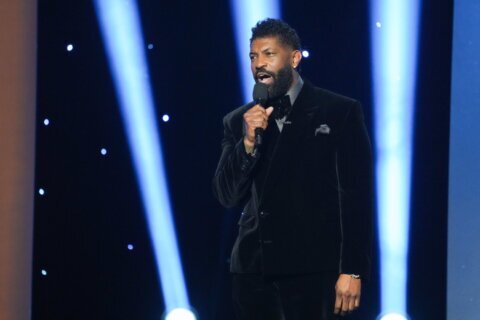Hear the full conversation on today’s “Beyond the Fame” podcast.
They rivaled Alabama and Diamond Rio as one of country music’s most popular groups.
This Saturday, Shenandoah joins Rodney Atkins at the Great Frederick Fair in Maryland.
“It’s going to be fun,” Lead Singer Marty Raybon told WTOP. “The kind of show we try to bring to town is high energy, getting folks involved, wanting folks to sing along. At the end of the show, if we’ve done what we’re supposed to do, then what’s happened is we’ve allowed folks to be a part of the show instead of just sitting and witnessing one.”
Born in Florida in 1959, Raybon grew up listening to all the country classics.
“My mom and dad thoroughly loved country music and bluegrass,” Raybon said. “My daddy was a fiddler, so therefore he loved Bill Monroe & The Bluegrass Boys. … As far as an individual artist, that ranged from Charley Pride, Vern Gosdin, Johnny Paycheck, Merle Haggard, George Jones, loved them all. … I thought what all of them brought to the table was good eatin’.”
In 1984, he moved to Nashville to give his own country career a shot.
“I had the same idea about 2,000 other people had the same week,” Raybon said. “I was going to go up there and make myself a big star,” Raybon said. “Come to find out, it was a whole lot more different from that. … I was block and brick layer, so I thought, ‘Well, if I can’t find no work, I can always go on a construction site somewhere and lay some block or some brick for somebody.”
He eventually found his footing in Muscle Shoals, Alabama, forming Shenandoah in 1984 alongside drummer Mike McGuire, bass guitarist Ralph Ezell and keyboardist Stan Thorn,
They recorded their self-titled first album in 1987, but it was their second album, “The Road Not Taken” (1989), that featured hits like “The Church on Cumberland Road.”
“After the first album, going out to do live shows, we didn’t have a lot of high-energy material,” Raybon said. “If we wanted to do something high-energy, we were doing somebody else’s music. So, when we had the opportunity to do something like that, we were tickled to death. We thought it was a smash when they played it for us. … It wound up being an absolutely wonderful album.”
Indeed, it also featured “Two Dozen Roses,” “Sunday in the South” and “See If I Care.”
“A lot of acts suffer with a sophomore album, [but] we had five singles that came off of that project,” Raybon said. “‘Two Dozen Roses’ is one of those that it kind of tongue-in-cheek talks about ‘if I had two dozen roses and an older bottle of wine, if I really could have hung the moon would it change your mind? What’s it going to take for you and I to put the wheels back on this thing?'”
He said anyone who has every been in a relationship can relate to that song.
“Today, my wife and I are celebrating 36 years of marriage,” Raybon said. “We’ve had our ups and downs. … My wife and I desperately love each other, but there’s been some times we didn’t get along the best, but it was never enough to decide that we’ve had enough. ‘Two Dozen Roses’ says, ‘Look, I want to do whatever it takes to make sure that we keep this thing together.'”
Their third album, “Extra Mile” (1990), included the hit “Next to You, Next to Me.”
“Up through the first two records, we never had a fiddle on an album and that was always a little surprising,” Raybon said. “All of a sudden, when ‘Next to You, Next to Me’ was pitched to us, it was a bluegrass tune. … I loved it because of cutting my teeth on bluegrass and my dad being a fiddler player. … We definitely had to get a fiddler, so we did and we hired Donnie Allen.”
Their fourth album, “Long Time Comin'” (1992), featured “Rock My Baby,” while their fifth album, “Under the Kudzu” (1993), included “If Bubba Can Dance (I Can Too)” and “I Wanna Be Loved Like That,” opening with the line, “Natalie Wood gave her heart to James Dean.”
“Somebody can go, ‘Yeah, I gotcha. I watched that movie,'” Raybon said. “Then you turn around and bring it back to mom and dad and the loved they had. … Then you find out this old man in a grave yard in a garden of stone, it’s been seven years and he still loves her as much today. … That’s one that the crowd gets singing along on. Folks really love that song. It just hits home.”
They won a Grammy with Alison Krauss on “Somewhere in the Vicinity of the Heart” (1994).
“Alison’s a peach,” Raybon said. “She came in to sing and Alison is so good. She’d sing her part and go, ‘Oh that sounds terrible, let me do it again.’ … She’s a perfectionist. Every time you’d think, ‘Certain to goodness, she can’t beat that.’ … That was a wonderful year to be hooked to her star. That year at the Grammys and the CMAs, Alison was winning anything and everything.”
On the day we spoke, Raybon was driving through Alabama to give a eulogy at a friend’s funeral in Mississippi, a selfless act instead of his plans to celebrate his 36th wedding anniversary.
“My wife said, ‘I thought we were going to do something on our anniversary?'” Raybon said. “I said,’ Look, here maybe in a week or two, let’s me and you get in the car and I’ll drive us over to Pigeon Forge and let’s spend a couple days in the mountains. It’s really the place I probably unwind the most. … We really enjoy it … The view up there is knockin’ out. It’s just absolutely beautiful.”
Hear the full conversation on today’s “Beyond the Fame” podcast.







